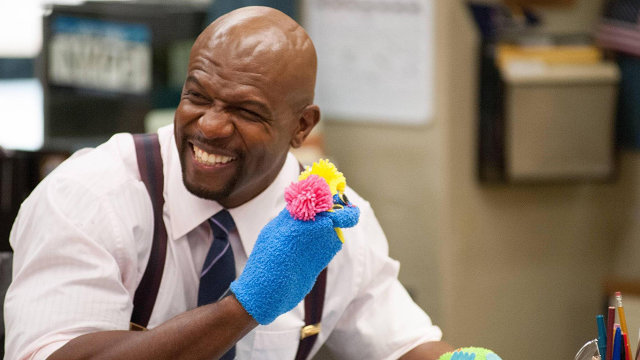The real story, the universal story, is that we all stand on a pair of shoulders. We are, all of us, the sum of our influences. We've all been taken by the hand and led to a better, more purposeful place.
- Denzel Washington, A Hand To Guide Me, 2006
Discussing the mediums of film, television and media, in relation to people of color and society.
Showing posts with label Quotes. Show all posts
Showing posts with label Quotes. Show all posts
Sunday, May 11, 2014
Saturday, March 8, 2014
Terry Crews on Giving It Your All
"You've gotta go. And when it's time to go, go. And I took that whole thing into entertainment, where you don't know when your next opportunity is going to come. You can't say I'm gonna be here forever. Because there are guys who've said that. And they're not here anymore. You just gotta go. When you get your shot, you give it everything you have."
- Terry Crews
- Terry Crews
 |
| From FastCompany |
Saturday, February 8, 2014
James Earl Jones On Overcoming Obstacles
Sunday, January 12, 2014
Harry Belafonte on Race & Cinema
This is from a speech made by the legendary artist Harry Belafonte at the New York Film Critics Circle Awards last week.
"... The power of cinema is an uncontainable thing and it's truly remarkable, in its capacity for emotional evolution. When I was first watching the world of cinema, there was a film that stunned the world, with all its aspects and art form. They did a lot, at that time. The film was done by D.W. Griffith, and it was called The Birth of a Nation, and it talked about America's story, its identity, and its place in the universe of nations. And that film depicted the struggles of this country with passion and power and great human abuse. Its depiction of black people was carried with great cruelty. And the power of cinema styled this nation, after the release of the film, to riot and to pillage and to burn and to murder black citizens. The power of film.
"... The power of cinema is an uncontainable thing and it's truly remarkable, in its capacity for emotional evolution. When I was first watching the world of cinema, there was a film that stunned the world, with all its aspects and art form. They did a lot, at that time. The film was done by D.W. Griffith, and it was called The Birth of a Nation, and it talked about America's story, its identity, and its place in the universe of nations. And that film depicted the struggles of this country with passion and power and great human abuse. Its depiction of black people was carried with great cruelty. And the power of cinema styled this nation, after the release of the film, to riot and to pillage and to burn and to murder black citizens. The power of film.
At the age of five, in 1932, I had the great thrill of going to the cinema. It was a great relief for those of us who were born into poverty, a way we tried to get away from the misery. One of the films they made for us, the first film I saw, was Tarzan of the Apes. [Ed note: The movie is called Tarzan the Ape Man.] In that film, [we] looked to see the human beauty of Johnny Weissmuller swinging through the trees, jump off, and there spring to life, while the rest were depicted as grossly subhuman, who were ignorant, who did not know their way around the elements, living in forests with wild animals. Not until Johnny Weissmuller stepped into a scene did we know who we were, according to cinema.
Throughout the rest of my life ... on my birth certificate, it said "colored." Not long after that, I became "Negro." Not too long after that, I became "black." Most recently, I am now "African-American." I spent the better part of almost a century just in search of, seeking, "Who am I? What am I? What am I to be called? What do I say? Who do I appeal to? Who should I be cautious of?" In this life, when we walk into the world of cinema, we use the instrument that is our ability to try to give another impression of who and what we were as a people, and what we meant to this great nation called America. I'm glad that Sidney Poitier should step into this space right after the Second World War, and new images of what we are as people, certainly as men.
Wednesday, December 4, 2013
Tuesday, October 22, 2013
Eddie Murphy on Creativity and Art
"It's not the public that inspired an artist to create. An artist feels the need to create even if there is no public. If there were no one on the planet I'd still do funny things. I'd just be laughing by myself."
- Eddie Murphy, Playboy, February 1990
- Eddie Murphy, Playboy, February 1990
Friday, September 6, 2013
Barry Jenkins on Being A Black Filmmaker
"I’m a black filmmaker. I must be. When I think of characters, or rather, when characters come to me — as the best ones do, outside of conscious thought — overwhelmingly they are black. And when I introduce these characters and films into the production framework of this industry, the funding and distribution “restrictions” I’m met with as a result of those characters’ blackness would remind me, if it weren't clear already, that I am indeed black."
The above quote comes from the NY Times piece 20 Directors to Watch in which the Times profiled 20 filmmakers who are making their voices heard. Barry Jenkins directed the 2008 film "Medicine for Melancholy," which centers around a young couple who spend a day with each other in San Francisco. It's a film that I highly recommend. The piece also features Dee Rees, who directed the 2011 highly regarded film "Pariah."
Sunday, June 23, 2013
Sinbad Reflects on His Parents
"My mother and father taught me everything: integrity, honesty, being responsible. My father said you can't be anything unless you accept responsibility for all your failures. My mother wanted me to have a tough hide but a tender heart."
- Sinbad, Parade, September 1994
Thursday, April 18, 2013
Richard Pryor on Race, Education and Success
"I live in racist America and I'm uneducated, yet a lot of people love me and like what I do, and I can make a living from it.You can't do much better than that."
- Richard Pryor
- Richard Pryor
Labels:
Black President,
Comedy,
Education,
Quotes,
Race,
Richard Pryor,
Success
Saturday, March 16, 2013
Debbie Allen on Work and Perseverance
"I pounded pavements and went to every audition. That was my spirit. Work at whatever you do, whether you get paid or not."
- Debbie Allen, Parade, November 17, 1991
- Debbie Allen, Parade, November 17, 1991
Saturday, February 9, 2013
Gregory Hines on Entertainment
"The best entertainment speaks to the human condition in an honest way."
- Gregory Hines, Parade, May 31, 1992
- Gregory Hines, Parade, May 31, 1992
Friday, November 30, 2012
Charles S. Dutton on the Difference Between Entertainers, Actors and Artists
"An entertainer will do anything. An actor will do most things. But an artist will only do those things he or she feels advances civilization."
- Charles S. Dutton
- Charles S. Dutton
Friday, April 6, 2012
Charlie Parker on Art & Music
"Music is your own experience, your thoughts, your wisdom. If you don't live it, it won't come out of your horn. They teach you there's a boundary line to music. But, man, there's no boundary line to art."
Sunday, December 4, 2011
Louis Gossett Jr. on Blaxploitation Films and Black Actors
". . . The responsibility for film imagery must be extended to the producers who come up with these scripts. The blame can't be placed on black actors because they have to work - any place and any time they can. They have rent to pay just like everybody else."- Louis Gossett Jr., NY Amsterdam News, 1974
Friday, October 21, 2011
Overcoming Obstacles and Controlling Your Interests
"When you hit a roadblock in this business, you can give up, but I learned a lot and made relationships through those attempts. I decided, if I was willing to invest my money to gamble on a project I didn't own, why not spend that money on something I could control?"
-- Bryan Barber, Director of "Idlewild," courtesy of Shadow and Act.
Subscribe to:
Posts (Atom)





